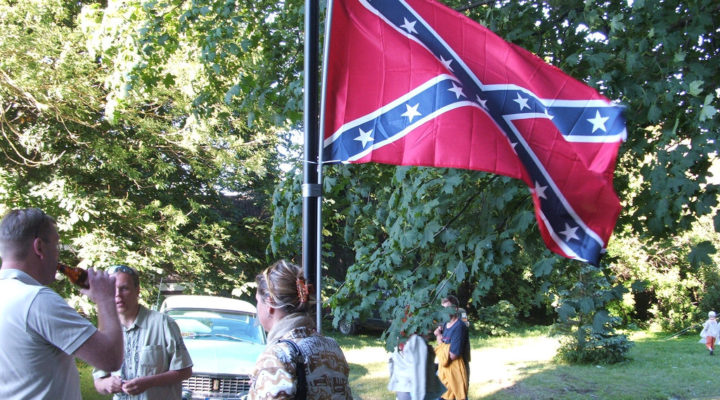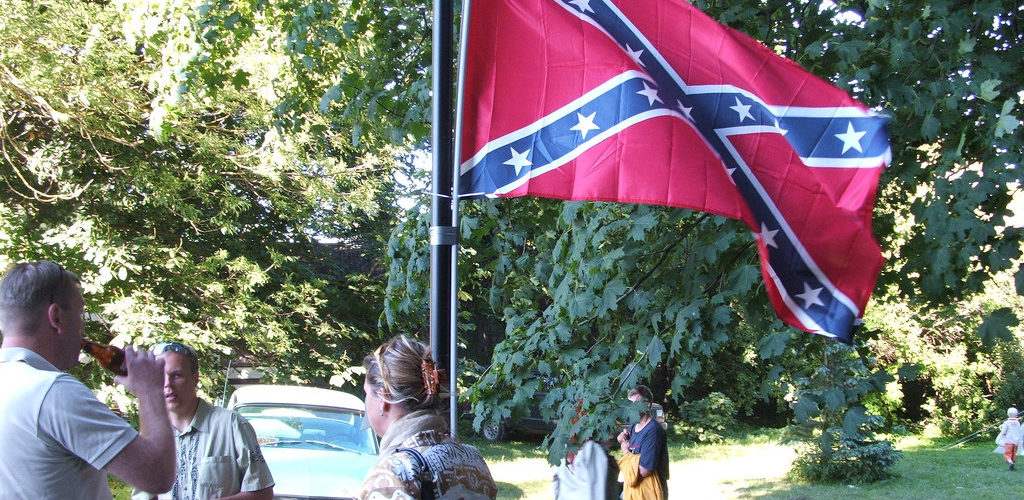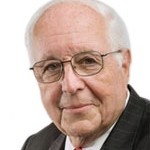One hundred seventy one years after its founding over a dispute about whether slaveholders could be appointed as missionaries, the Southern Baptist Convention passed a strongly worded resolution June 14 against public display of the Confederate flag.
The resolution, as amended during debate on the floor, calls on Christians “to discontinue the display of the Confederate battle flag as a sign of solidarity of the whole Body of Christ, including our African-American brothers and sisters.”
Former SBC President James Merritt was among messengers recognized from the floor to speak for or against the recommendation. Merritt, great-great grandson of two men who fought in the Confederate army, said: “I cannot undo what they fought for, but they cannot undo what I wish they had done and I pray we will do today.”
Terming the vote a “seminal moment in our convention,” Merritt, pastor of Cross Pointe Church in Duluth, Ga., predicted the vote will “reverberate through this nation not just today but I believe a hundred years from now.”
“This is not a matter of political correctness,” Merritt said. “It is a matter of spiritual conviction and biblical compassion.”
Merritt said regardless of an individual’s views on the meaning of the Confederate flag, one fact cannot be denied. “This flag is a stumbling block to many African-American souls to our witness,” Merritt said. “I rise to say that all the Confederate flags in the world are not worth one soul of any race.”
One messenger, John Killian, pastor of Maytown Baptist Church in Maytown, Ala., opposed the resolution, saying it raises more questions than it answers.
“Will we cease use of names liked Broadus and Manly and take Broadman off everything, because they were avid supporters of the Confederacy?” Killian asked. “Will we cease having a Lottie Moon offering because she was a supporter of the Confederacy?”
Another messenger argued: “This is a political issue, not a kingdom issue.”
SBC President Ronnie Floyd cut off debate and called for a vote when time allotted for discussion of the resolution expired. That prompted a point of order from Paul Pressler, a Houston layman credited as co-founder of the “conservative resurgence” battle between conservatives and moderates in the last decades of the 20th century.
“I’ve been to 40 straight conventions, with the exception of last year because they thought I was on my deathbed,” Pressler said. “But I believe in fairness. I believe in openness. I think you deliberately kept me from speaking.”
“Tell me, did you know beginning last night that I was going to speak to this?” Pressler addressed the leader on the platform. “Mr. President, did you know that beginning last night that I was going to speak to this? Mr. President, Did you know beginning last night ….”
Floyd replied: “You said that you wanted to speak to this, but you were not recognized due to the situation. Time had expired. I had no alternative.”
“I have been here since the very first minute to speak on this motion,” Pressler objected. “And I feel that you have done a very bad, illegal, improper and unfair thing in cutting out my ability to speak.”
Floyd invited head parliamentarian Barry McCarty to explain procedure. “Barry, you knew I was going to speak to this,” Pressler implored. McCarty said: “Would you please cut that microphone?”
McCarty, who was a Church of Christ minister when he was hired to help navigate parliamentary procedure during the stormy years of the SBC holy war but recently became a Southern Baptist, said the blind electronic audio system used by the convention to help moderate debate lines up speakers in the order they push a button indicating their desire to speak.
“We don’t know up here who you are, and frankly, it doesn’t matter who you are,” McCarty said. “You are all messengers, and whether you are a friend of the president or a friend of someone else or whether you’re a past president of the convention, the system doesn’t recognize who you are. It’s first come, first serve.”
McCarty said a number of lights were blinking when the time expired, but it isn’t uncommon for there to “be more people who wish to speak to an issue than there is time allowed to speak to that issue.”
After ruling the point of order not well taken, Floyd said the automated microphone-ordering system has been in use for many years.
“I just want to assure every messenger in this auditorium that we would be absolutely fair to every messenger,” Floyd said. “That is our goal. We have worked very diligently to do that. That is our commitment, and that is the legacy of 30 years of Barry McCarty.”
“Please know that relating to Judge Paul Pressler, I love him and I have great respect for him, and I would treat him with all fairness as the president of the Southern Baptist Convention,” Floyd said.
Resolutions committee chairman Stephen Rummage, pastor of Bell Shoals Baptist Church in, Brandon, Fla., introduced the committee-drafted resolution based on one submitted by African-American pastor Dwight McKissic of Arlington, Texas, as “a further step in the right direction concerning racial unity.”
Russell Moore, head of the SBC Ethics and Religious Liberty Commission, wrote a blog celebrating the statement.
“Today, messengers to the Southern Baptist Convention, including many white Anglo southerners, decided the cross was more important than the flag,” Moore said. “They decided our African-American brothers and sisters are more important than family heritage. We decided that we are defined not by a Lost Cause but by amazing grace.”




